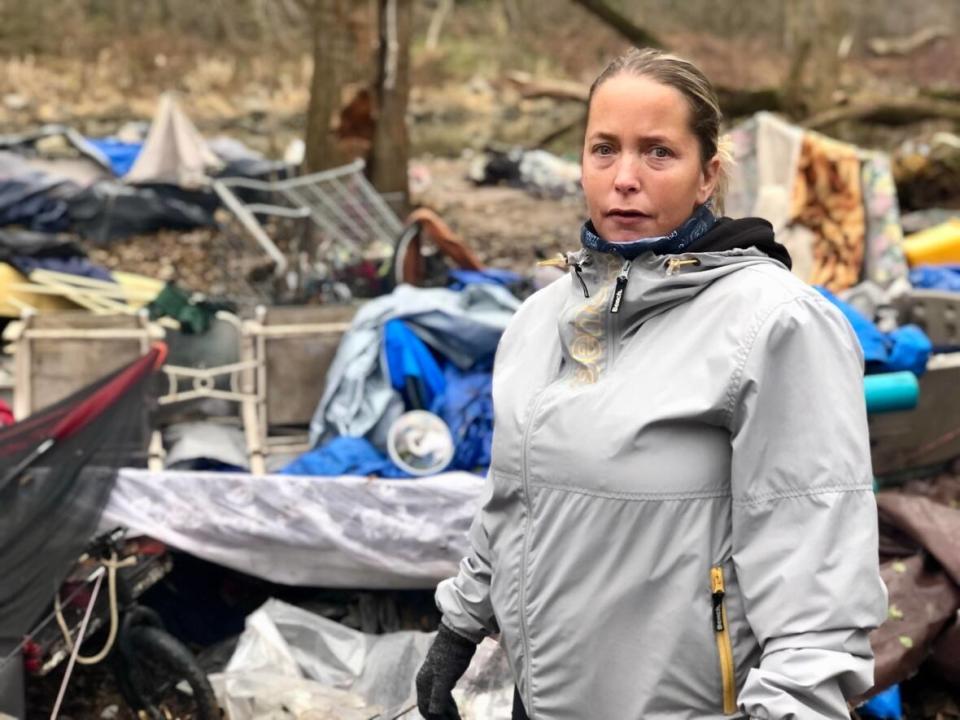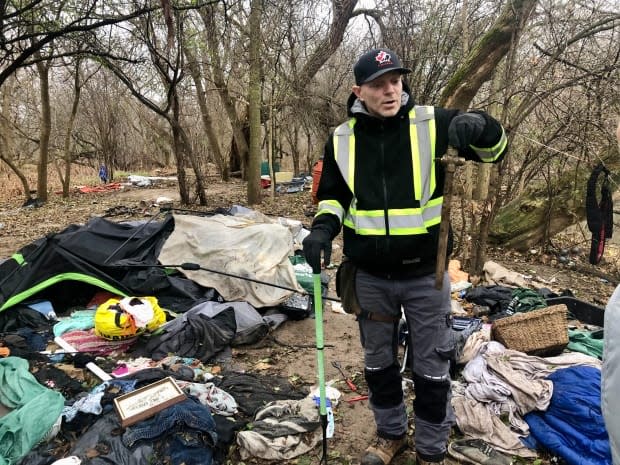When encampments come down, who's on the hook for cleaning them up?

A couple living in London, Ont. is calling out the city for allowing abandoned and collapsed tents, soaked mattresses and turned over shopping carts to remain strewn over a large swath of riverfront.
"I just think it's really sad," said Amy Holman, 46, from the middle of the debris on the Adelaide Hiking Trail near Trafalger and Adelaide streets. "People are scared to come down here and that's really sad because the walking trails, they're beautiful down here."
Holman and her partner, Jody Leblond, an avid fisherman, are sympathetic to those looking for shelter in a city struggling to meet its housing demands. They also commend the occupants of a nearby encampment for keeping its area tidy, but they are concerned about the amount of trash left behind in other instances.

"A few bad apples make them all look bad," said Leblond, 44. "If they keep clean like the first camp we passed, I have no problems with it because I understand the problem."
"I just think it's really sad. People are scared to come down here." - Amy Holman, London resident
"The cost of rent is so outrageous," said Holman. "People have nowhere to turn to."
When CBC News visited the Adelaide Hiking Trail this week, a half dozen collapsed tents, still full of belongings, covered a soccer field-sized area. Clothing, shoes, a rain barrel, a rubber dingy and even a framed picture were among the debris.
"This tent is absolutely chalked full of people's belongings, like it just doesn't make any sense to leave all this stuff," said Leblond. "One good storm, all this is going to blow right down into the Thames River, which is not good for the environment," said Holman.
Support for those in encampments
"Messes by the river are a bummer, but also, can we not forget that people are dying preventable deaths," said frontline worker Dan Oudshoorn, who is also a founding member of the advocacy group, Forgotten 519.
"Has the city demonstrated that it's actually coming to support people," said Oudshoorn who staged a hunger strike on the steps of city hall this summer, calling for more help for those experiencing homelessness. "Or is it coming to displace people, threaten people, make them feel uncomfortable, make them feel like they have to flee their site?"
"Messes by the river are a bummer, but also, can we not forget that people are dying preventable deaths," - Frontline worker, Dan Oudshoorn
In August, the city released an updated protocol for when bylaw officers would remove encampments; for instance, when a tent is blocking a sidewalk or a road, or when more than six tents are gathered. It also named a number of sites where encampments would be permitted and where they are not.

"The city works both proactively and reactively to clean up garbage and debris along the river regardless of how it got there," said City of London spokesperson, Jo Anne Johnston. "Proactively on all city property addressing any concerns (especially safety) and reactively for all service requests that come in regarding city and private property."
"We engage with encampment occupants whenever and wherever possible," said Johnston.
According to Oudshoorn, when the city works collaboratively with those living in encampments, they're more likely to keep the area clean and tidy, but admitted it's not that simple.
"People are complicated. Some people are cleaner than others," he said. "Some people are healthier than others. Maybe there is a COVID outbreak in a campsite."
Oudshoorn also worries one messy spot on the river puts a lot of blame on one group of people. "Even if a mess was left intentionally, can we cut them a little slack and just clean it up ourselves?"


